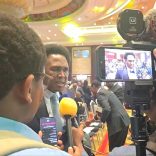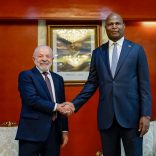Mozambique Minister urges regulatory review to enhance transparency in telecoms and radio ...
Mozambique: Chapo says pacification agreement is being complied with

File photo: Lusa
The President of Mozambique, Daniel Chapo, guarantees that the agreement for the country’s peace after the electoral process is being fulfilled and that the signatories, the political parties, are satisfied.
“Those who signed the agreement say that the agreement is being fulfilled. We have never heard any complaints from the signatories of the agreement,” Daniel Chapo told the Lusa news agency, in Seville, Spain, where he is participating in the 4th United Nations Conference on Financing for Development.
Opposition politician Venâncio Mondlane said on June 27 that the points agreed with the Mozambican president, for the peace of the country after the electoral process, are not being fulfilled, but that he remains available for this peace.
In statements to Lusa, Daniel Chapo underlined that Venâncio Mondlane “is not part of the agreement”.
“This is a very important aspect. There was no agreement signed with Venâncio Mondlane. And I don’t know what agreement he is talking about. There was an agreement, which we signed with the political parties, and Venâncio Mondlane does not have a party yet, and he may have one in the future,” added the Mozambican president, who considered that there was “a distortion of the message”.
“This must be clear. There is an agreement with the opposition political parties. And he does not have a party,” Chapo insisted.
Daniel Chapo considered that the parties that signed it should be the ones to say whether or not the agreement is being complied with.
“Those who signed the agreement are realizing that the agreement is being complied with, all the steps are being followed, they are quite satisfied and we continue to work,” he stressed.
“There is only one agreement, there are not two agreements. And if it is this one [to which Venâncio Mondlane refers], the signatories are satisfied,” Daniel Chapo insisted.
READ: Mozambique: Mondlane says pacification agreement not being complied with
After months of social unrest and protests against the election results and the victory of Daniel Chapo and the Mozambique Liberation Front (Frelimo), the head of state and Venâncio Mondlane met for the first time on 23 March in Maputo and agreed to bring peace to the country, repeating the meeting on 20 May.
Before that, on 5 May, the president signed an agreement with all parties to bring peace to the country, providing for the review of the electoral law, the Constitution of the Republic, the powers of the head of state, among other changes.
Venâncio Mondlane, a former presidential candidate, stated on 27 June that “this is not what is being put into practice”, “neither in terms of discourse, nor in terms of positions, nor in terms of execution and implementation, of what was said”.
The opposition politician acknowledged that at the time “the talks” went “very well”, with “points of consensus”.
“The only problem is that after we left that table, the head of state has repeatedly adopted a stance that, to me, contradicts the consensus we reached there. For example, we had reached a consensus regarding the people who are being held in connection with the demonstrations. That there was a real need for these young people to be released and to be reunited with their families, leaving the technical discussion of how this should be done, whether it is a pardon or an amnesty,” Mondlane recalled.
He stressed that there was an understanding that these detainees – still around 3,000, according to non-governmental organizations on the ground – should be released because a “roadmap for reconciliation, peace and even integration of these young people” was underway.
READ: Mozambique: NGO says “selective” pardon contravenes constitutional principles
“It is paradoxical that the same head of government appears in public saying that he rejects Venâncio’s proposal because there is no legal basis for granting amnesty to these young people,” Mondlane said.












Leave a Reply
Be the First to Comment!
You must be logged in to post a comment.
You must be logged in to post a comment.